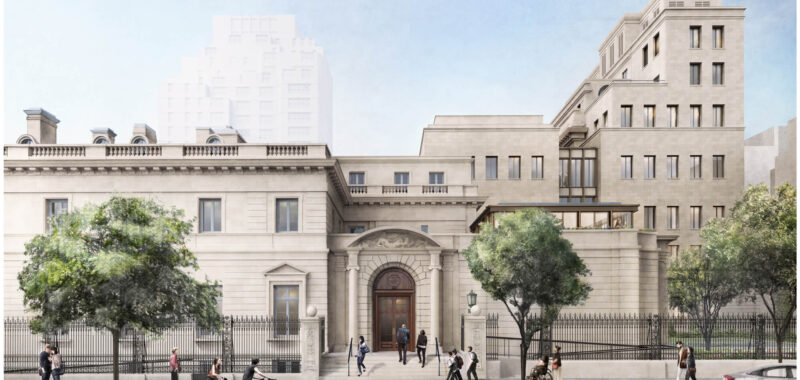The Frick Collection announced this week that it will be reopening to the public in April 2025 following a long-awaited renovation by Selldorf Architects. The Frick Collection is a jewel box of New York City’s museum lineup, sited on the Fifth Avenue “Museum Mile” and comprising a stately 19th-century Italianate mansion and gardens. The renovation has been years in the making, as Selldorf Architects navigated a stringent landmark process owing to the architectural and cultural importance of the museum. In the meantime, the collection has been on view at the Frick Madison, within the former Met Breuer building.

The Frick mansion was the residence of the Frick industrialist family before it was inaugurated as a museum in 1935. Visitors are able to see a classical canon of painters from Vermeer to Goya and Titian, all in period-specific galleries that display the opulence of turn-of-the-century New York. Yet the museum, being first a residence, was never the most natural fit for a museum of the popularity and caliber it commanded. Selldorf’s renovation of the institution to restore, retrofit, and expand its interiors first began in 2016, making this project nearly a decade in the making.
While early schemes first did away with the Frick’s only on-site green space, the garden court, preservation appeals and public outcry resulted in a new scheme that maintains that space and instead spreads new gallery and admin spaces into a new “tower” that rises a few floors above the original Frick structure. Its materiality is consistent with the mansion, yet it shows contemporary restraint in its lack of decoration and fenestration. The new building is shorter toward the Fifth Avenue elevation and gradually steps up toward the back of the lot. A glazed middle section bisects the new massing, opening it up for more views and light.

Upgrades to expect in the original architecture by April 2025 include newly revamped gallery finishes and circulation, including a new layout for the entrance hall; expanded galleries in a new ground-up addition adjacent to the garden courtyard; and perhaps most notably, second-floor access. The upper level of the museum was first the private quarters of the Frick family and then administrative offices since 1935. For the first time now, these rooms are reimagined into gallery spaces and open to all visitors via the opulent grand stair. Curators have heightened this more intimate upper-level experience by choosing to display the personal collections and favorites of each member of the family in their respective living quarters. For example, the much-anticipated “Boucher Room” will be relocated from its first-floor viewing area to its original setting upstairs in the former private sitting room of the founder’s wife, Adelaide Childs Frick.

Ian Wardropper, the Frick’s outgoing Anna-Maria and Stephen Kellen Director, commented on his excitement to bring back “such a unique museum within the cultural landscape of New York City.” He continued that “the intimate encounters with art offered by our historic galleries, along with new spaces transformed from former domestic interiors, remain a cornerstone of the Frick experience.”

The Frick Collection will welcome visitors back in April 2025 with a suite of opening programs including rare works on paper visible in its new Cabinet Gallery on the first floor: within these protected boxes, sketches and ephemera by artists like Degas, Goya, Ingres, Rubens, and Whistler will be on view despite their notorious sensitivity to light. Directly referencing the institution’s opening in 1935, a special installation of ceramic floral sculptures by Ukrainian artist Vladimir Kanevsky will also be on display: His glazed arrangements recall the famously ebullient fresh bouquets that adorned the mansion upon its first opening. These will be on display for six months from the April opening. A new Vermeer exhibition as well as a full suite of musical performances are also scheduled to mark the debut of the new 220-seat Stephen A. Schwarzman Auditorium, designed by Selldorf Architects.

“The Frick’s reopening is an invitation to all New Yorkers and art lovers from around the world to discover—or rediscover—incredible works of art from our permanent collection,” said Elizabeth M. Eveillard, chair of the Frick’s board of trustees, in a statement. “Following this long-awaited unveiling, we look forward to giving our audiences the opportunity to experience several newly constructed spaces.”

